[2019-01-25] Angola’s economy enters period of higher growth, EIU says
Source: Macauhub
Angola’s economy is expected to grow at an average rate of 2.6% per year in the 2019-2023 period, an improvement on the average rate of 1.4% rate between 2014 and 2018, the Economist Intelligence Unit (EIU) said in its latest country report.
This growth rate, which is higher than in the period but still reduced compared to the growth rates recorded in the past, is due to the fact that the Angolan economy is still too dependent on the oil sector, and the project to diversify the economy has produced modest results.
The economic growth expected is due to the start-up of the Kaombo oil field and a stronger expansion of public expenditure as well as private consumption, the EIU said.
The expected growth rate is much lower than in the decade to 2014 said the EIU analysts, who expect a decline in per capita income by 2023, given that population growth is higher than the forecast economic growth.
The document also predicts that Angola’s currency, the kwanza, will continue to depreciate against the main currencies in 2019, and the strengthening of the dollar, coupled with investor fear of emerging markets, will mean that kwanza depreciation will continue until at least 2023, the last year covered by this analysis.
The rate of inflation, which has remained consistently at two digits, is expected to decline slightly by 2023, when it is expected to be 10.5%, whereas for this year the EIU expects a rate of 23.7%.
The report noted that the Angolan government appears to be committed to achieving fiscal consolidation, particularly to reduce accumulated public debt to around 60% of the Gross Domestic Product (GDP), against a current level of 70%.
The EIU noted that the General State Budget (OGE) for 2019 was drawn up and later approved with the price of a barrel of oil at US$68, with a growth forecast of 2.8% and with expenses increasing by 17% compared with the 2018 budget.






















